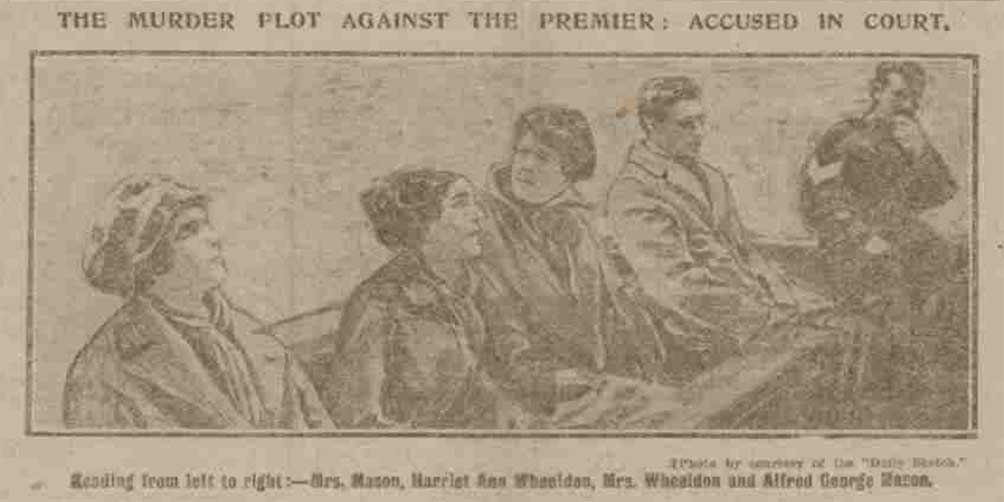|
Alice Wheeldon and her daughter Hettie lived in the Midlands railway town of Derby. They had both been suffragettes in the Women's Social and Political Union (WSPU) and were socialists.
During the First World War, they opposed conscription; their home in London Road and Alice's second-hand clothes business in Pear Tree Road became safe havens for conscientious objectors on the run.
They were friendly with William (or Willie) Paul, a member of the Socialist Labour Party, a small Marxist group linked to the American socialist Daniel de Leon. Willie lived in nearby Littleover, and Alice had helped him to start a clothes stall in Derby market.
Hettie, who taught Scripture in Ilkeston, was courting Willie's friend, Arthur MacManus. He was one of the Clydeside shop stewards (rank-and-file delegates) who had been deported from Glasgow by the government and was working at Cunard's in Liver- pool. Arthur, also a member of the SLP, was helping the Wheel- dons to smuggle conscientious objectors across the sea to Ireland and America.
In December 1916, a man who called himself Alex Gordon sought shelter with Alice. He claimed to be a conscientious objector on the run and he introduced her to Comrade Bert, who said he was a member of the revolutionary syndicalist group, the Industrial Workers of the World (the British group of the Wobblies).
'Alex Gordon' was, in fact, F. Vivian and 'Comrade Bert', Herbert Booth. They were both spies employed by an intelligence unit in the Ministry of Munitions, whose activities were soon to become centralized in MI5 and the Special Branch. Alex Gordon maintained that Alice Wheeldon was conspiring to kill both Lloyd George and Arthur Henderson, a Labour Party supporter of the war in the government. Alice Wheeldon's reason was that he had promised to help the men on the run escape if she obtained poison to kill dogs which he told her were guarding conscientious objectors (COs) in detention centres.
She obtained some poison, curare, from her son-in-law, Alf Mason, a laboratory attendant at Hartley University College in Southampton, thus drawing him and her daughter Winnie into the plot. The prosecution case rested on the poison intercepted in the post, on letters in which Alice, Hettie and Winnie vehemently cursed Lloyd George, and on the evidence of Alex Gordon and Herbert Booth - though Gordon never testified in court. When the Wheeldon's Alice and Hettie were brought to trial early in 1917, the political climate meant that the word of an absent agent provocateur was more respectable than the testimony of socialist feminist opponents of the war.
Alice, her daughter Winnie, and her son Alf received sentences of ten, five and seven years respectively. There was nothing to implicate her other daughter Hettie, who was found not guilty.
The three served two years of their sentences and were released after the Home Office, at the request of Lloyd George, reviewed their case. Weakened by her time in prison, Alice Wheeldon caught influenza and died in her early fifties shortly after her release in 1919.1 The case of Alice Wheeldon aroused strong emotions in 1917, and is still capable of stirring recognition, indignation and sorrow after all these years, perhaps all the more so because Alice Wheel- don was without the usual heroic accoutrements. There she was, living in Derby, known to her friends as a kind woman, holding her radical views with passion, selling papers, speaking in the marketplace, going to meetings, looking after her shop.? Then she is suddenly cast in the role of a conspirator, plotting assassination, morally deranged, and outside the pale of reasonable political motivation She is projected beyond the ordinary, she becomes distanced from everyday concerns, and is framed as part of the sensational.' But the combination of circumstances that brought about Alice Wheeldon's trial and death have more than an emotional and dramatic pull. There is an intellectual fascination, historically and politically, in understanding the forces which converged upon her to fracture her existence.
The Wheeldons were rank-and-file rebels. They were the kind of people who usually leave only chance or scattered reference, of whom nothing much is remembered except in scraps of local and kinship memories. In this case, however, the brilliant spotlight of public affairs trapped the family tragically and remorselessly. Ironically, their fate illuminated, for the curiosity of posterity, a lower- middle-class Midlands milieu in which socialism, feminism and pacifism combined. This was not the stuff of which memoirs and autobiographies are customarily made. Instead, we have to read through the lines of local newspaper crime reports and look through Alice's, Hettie's and Winnie's intercepted letters to reconstruct their story.
I originally reconstructed the story in the play Friends of Alice Wheeldon in 1980; here I have also reworked the historical background material, drawing on new sources. I have presented the story so that both the play and the historical essay stand on their own separately, and maybe read independently. There is thus some repetition in the outline of the story. I hope readers will find the two accounts complementary rather than cumbersome.
Five years have passed since I wrote Friends of Alice Wheeldon.
The play's preoccupations grew from the dilemmas of the 1970s.
The reflections in 'Rebel Networks in the First World War', written in 1985, are informed by the political circumstances of the 1980s. In the long term, I believe these issues have a wider political relevance for what kind of socialism we can make and the forces which oppose its making.
The problems that the friends of Alice Wheeldon faced found apparent - but only partial - resolutions. Versions of their dilemmas lurk in contemporary left politics, and the state continues to use its powers of surveillance and the legal cover of the conspiracy charge for political reasons. The story, its setting and the concerns of its characters thus speak, at many levels, to the present.
|
|
|


 The People 4 February 1917
The People 4 February 1917